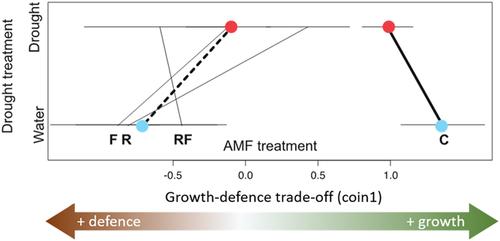Arbuscular mycorrhizal fungi prevent the negative effect of drought and modulate the growth-defence trade-off in tomato plants
Abstract
Introduction
A wide range of arbuscular mycorrhizal fungi (AMF) can be applied to agricultural soils as biofertilizers for increasing crop growth and yield. Current research also shows that AMF can stimulate plant defences against a range of herbivores and pathogens. However, to date, the efficient use of AMF in agriculture is largely impaired by our inability to predict the performance of different AMF-plant complexes in variable environments. For instance, AMFs by increasing plant foraging capacity might alleviate allocation constraints in relation to growth versus defences. However, whether this effect occurs might depend on the in situ conditions. The main goal of this study was to investigate the context-dependency of the ability of AMF to modulate plant growth and resistance against herbivores under variable soil water availability.
Materials and Methods
To address our goal, we performed a greenhouse experiment for measuring the effect of different AMF inocula (Funneliformis mosseae, Rhizophagus irregularis, or both) on tomato plants (Solanum lycopersicum) growth and defences against an insect herbivore under two conditions: a normal watering regime or drought conditions. We measured the functional, physiological and chemical traits of the plants.
Results
We found that AMF presence generally decreased plant growth, but increased chemical defences and resistance against generalist caterpillars. Such growth-defence trade-off was nonetheless dependent on the identity of the mycorrhizal inoculum and on soil water content. Under drought, inoculated tomato plants lowered their investment to defence and noninoculated plants lowered their growth.
Conclusion
This study highlights the influence of abiotic factors and fungal identity on plant–AMF–herbivore interactions. In a broader sense, our results point to the necessity of finding AMF species that have reduced context-dependency to climatic factors, for more widespread use in organic agriculture.


 求助内容:
求助内容: 应助结果提醒方式:
应助结果提醒方式:


